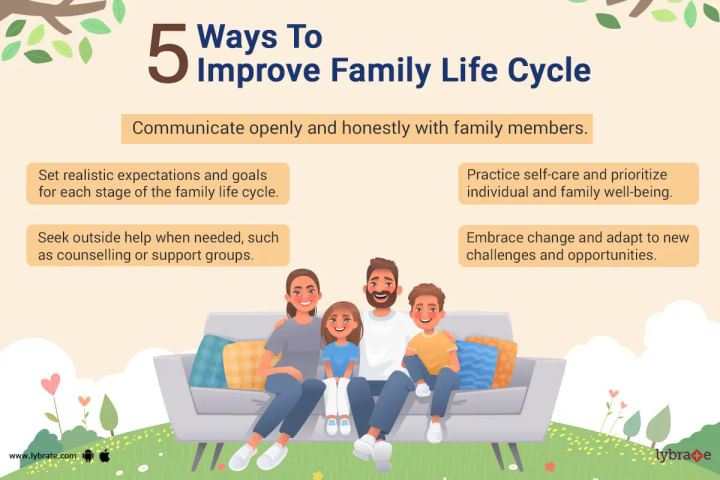What Is A Family Life Cycle
A family life cycle refers to the stages that a family goes through as it progresses through time. These stages include:
- The formation of a new family through marriage or cohabitation, which is marked by the birth of children.
- The child-rearing stage, in which couples focus on raising and providing for their children.
- The empty nest stage, in which children grow up and leave home, leaving the couple to adjust to a new stage of life without them.
- The aging stage, in which the couple faces the challenges of aging and potentially caring for elderly parents.
- The dissolution stage, in which the family unit may break apart through death, divorce, or separation.
It's important to note that families may experience different variations or may not go through all the stages. Also, The timing and duration of each stage can vary depending on individual family circumstances.
Why is it important to understand the family life cycle?
Understanding the family life cycle is important because it provides a framework for understanding the typical stages that families go through and the challenges they may face at each stage. This understanding can help professionals in fields such as counseling, social work, and marketing to better serve and support families, as well as provide individuals with a greater understanding of their own experiences and the experiences of others. Additionally, understanding the family life cycle can also help researchers study patterns in family development and functioning over time.
What can disrupt the normal family life cycle?
There are several factors that can disrupt the normal family life cycle, including:
- Death of a family member: The death of a parent, child, or spouse can cause significant disruptions to a family's normal life cycle and can lead to a need for adjustment and grief.
- Divorce or separation: The dissolution of a marriage or partnership can disrupt the family life cycle and lead to a new stage of development.
- Financial instability: Financial difficulties can cause stress and strain on a family, and may disrupt their ability to move through the typical stages of the family life cycle.
- Mental or physical illness: A family member's illness can disrupt the normal functioning of a family and may require additional resources and support.
- Social or cultural factors: Societal expectations and cultural norms can influence the family life cycle, and may disrupt it if they do not align with a family's experiences or beliefs.
- Natural Disaster: War and other unforeseen events.
All these factors can cause significant disruptions to the normal family life cycle, and may require additional support and resources to help the family navigate and adjust to these changes.
How can I improve my family life cycle?
There are several ways that you can improve your family life cycle, including:
- Communicate openly and honestly with your family members: Clear and open communication can help to build trust and understanding within your family, and can help to resolve conflicts and address issues more effectively.
- Seek support when needed: Whether it's through therapy, counseling, or other forms of support, seeking help when needed can be beneficial for your family as a whole.
- Build and maintain positive relationships: Strong and positive relationships with your family members can help to create a positive and supportive environment for your family.
- Establish clear boundaries and expectations: Having clear boundaries and expectations for behavior within your family can help to create a sense of structure and stability for everyone.
- Prioritize self-care: Taking care of yourself physically, mentally, and emotionally can help to improve your own well-being, and in turn, improve your ability to support and care for your family.
- Be open to change and adaptability: Families go through different stages, and being open to change and adaptability can help your family navigate these stages smoothly.
- Encourage and support each other's interests and goals: This can help create a positive and supportive environment, and can help each family member to feel valued and respected.
It's important to remember that every family is different, and what works for one family may not work for another. It's essential to be flexible, open, and willing to try new approaches to improve your family life cycle.



+1.svg)
